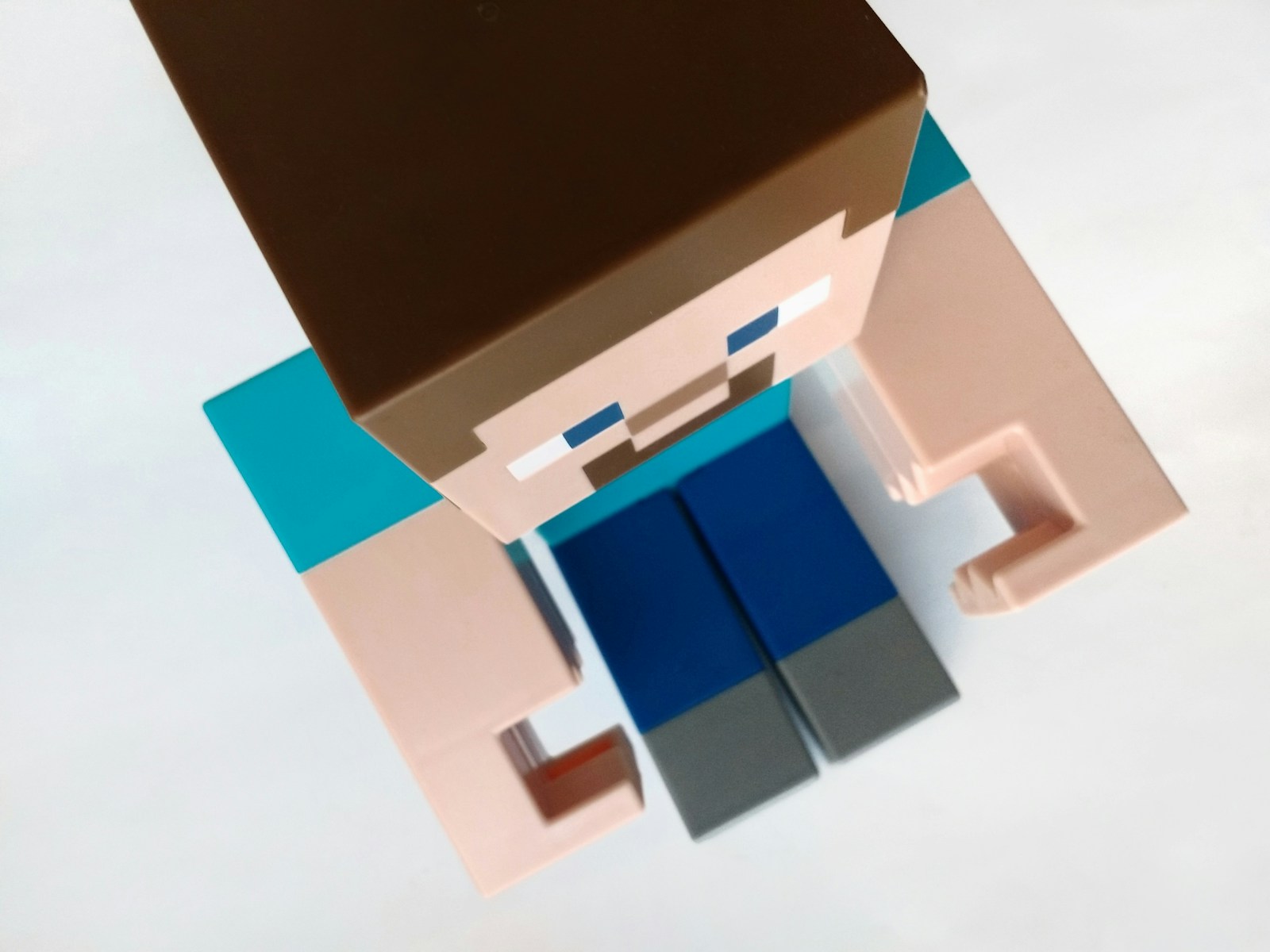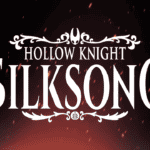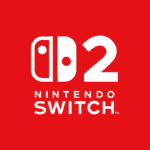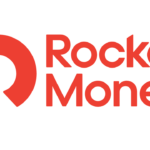Markus “Notch” Persson, the creator of Minecraft, has hinted at a potential new project that could eventually be referred to as “Minecraft 2” (although questions over who would own another Minecraft project would be important to iron out given that Notch sold Minecraft to Microsoft in September 2014 for $2.5 billion). This announcement has generated significant excitement among gamers, sparking debates about what the new venture might entail.
Minecraft, which has sold over 300 million copies and has 173 million monthly active users, has had a lasting impact on gaming culture. The anticipation for Notch’s new project highlights the ongoing appeal of his original game and the desire for innovative gaming experiences.
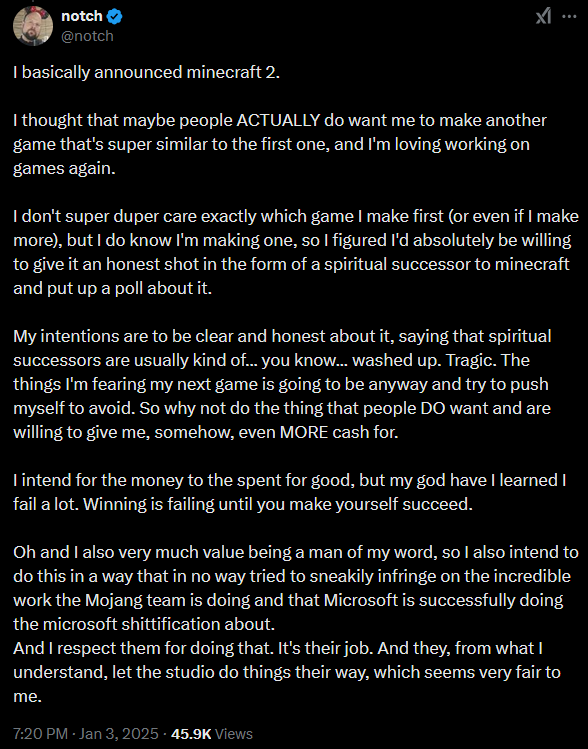
Notch’s New Project: What We Know So Far
The “Minecraft 2” Hint
Markus Persson, known as Notch, the creator of Minecraft, recently hinted at a new game. He suggested it would be “basically Minecraft 2.” This came from a poll on his X account. He asked if people wanted a new game from him or “basically Minecraft 2.” He then said this counted as an announcement. This has made many people excited. They want to know what Notch will make next.
What We Don’t Know
It’s important to know some key facts. Notch sold Mojang (the company behind Minecraft) to Microsoft in 2014. He has not worked on Minecraft since then. So, this new game is not an official Minecraft sequel. It is a project by Notch himself. We don’t have many details about the game itself. There is no name, release date, or gameplay information. All we have is the idea that it will be similar to Minecraft in some ways.
Minecraft’s Impact
To understand the excitement, it’s good to look back at Minecraft’s success. Minecraft is one of the best-selling video games of all time. As of 2023, it has sold over 300 million copies. The game’s open-world sandbox style lets players build almost anything. This freedom is a big part of why it’s so popular. The game has also had a huge cultural impact. It’s used in education and has a large online community.
Comparing Minecraft and Potential New Game
Since the new game is compared to Minecraft, let’s look at some of Minecraft’s key features:
| Feature | Description |
|---|---|
| Open World | Players explore a large, randomly generated world. |
| Building | Players can build structures and creations using blocks. |
| Survival | Players must gather resources and survive against monsters. |
| Multiplayer | Players can play together online. |
We don’t know if Notch’s new game will have all these features. But, the comparison suggests it will share some similarities.
What Could the New Game Be Like?
It’s hard to say exactly what Notch’s new game will be. It could focus on building, exploration, or survival. It might introduce new game mechanics or a different art style. It is also possible that it may not be similar to Minecraft at all. There is no official information to confirm or deny any theories.
Other Games Like Minecraft
If you like Minecraft, there are other games you might enjoy:
- Terraria: This game is a 2D action-adventure sandbox game. It has building, exploration, and combat.
- Roblox: This platform lets users create and play games made by other users. Many of these games have building and social elements.
- Lego Worlds: This game is similar to Minecraft but uses Lego bricks.
These games offer similar experiences to Minecraft. They may be worth checking out while waiting for more news about Notch’s project.
Minecraft’s enduring popularity, with over 173 million monthly active users as of 2023, highlights the demand for creative sandbox games. This large player base suggests a strong potential audience for Notch’s new project, especially given its connection to Minecraft. The game’s availability across various platforms, from PC and consoles to mobile devices, has also contributed to its widespread appeal. It’s likely that Notch’s new game, if successful, would also aim for broad accessibility.
The gaming landscape has changed a lot since Minecraft’s initial release. New technologies like virtual reality (VR) and augmented reality (AR) could influence game development. It will be interesting to see if Notch incorporates any of these technologies into his new project. This could set it apart from other sandbox games.
Minecraft remains a cultural phenomenon, with its influence extending beyond gaming into education and other areas. The anticipation surrounding Notch’s new project reflects the lasting impact of his original creation. Whether the new game captures the same magic remains to be seen, but the initial interest suggests a promising start.
Minecraft’s marketplace also offers a variety of user-created content, including skins, texture packs, and maps. This has extended the game’s lifespan and provided players with endless customization options. It’s possible that Notch’s new game could also incorporate user-generated content in some way.
Minecraft began as a small indie project and grew into a global phenomenon. This shows the power of innovative game design. Notch’s new game has the potential to follow a similar path, especially given his track record. The gaming world will be watching closely to see what he creates.
Minecraft’s success has also led to many spin-offs and related products, such as books, toys, and clothing. This shows the brand’s wide appeal. It’s possible that Notch’s new game, if successful, could also lead to similar opportunities.
Minecraft’s educational edition is used in classrooms around the world to teach various subjects, including coding and history. This demonstrates the game’s versatility and its potential for positive impact. It will be interesting to see if Notch incorporates any educational elements into his new project.
The anticipation for Notch’s new game is a testament to Minecraft’s enduring legacy. The gaming community is eager to see what he creates next. While details are scarce, the connection to Minecraft has generated significant buzz. Whether the new game lives up to the hype remains to be seen, but the initial interest is undeniable.
Short Summary:
- Notch hints at a spiritual successor to Minecraft following extensive community interest.
- A recent poll shows overwhelming support from fans eager for new adventures in a familiar style.
- The creator acknowledges legal limitations due to Microsoft owning the Minecraft brand.
In a remarkable turn of events, Markus “Notch” Persson, the visionary mind behind the iconic sandbox game Minecraft, has hinted at developing a spiritual successor. This announcement has sparked excitement while stirring discussions across gaming platforms. Notch’s candid interactions on X have paved the way for community engagement, allowing fans to share their hopes and expectations for what could potentially be a groundbreaking sequel. With his recent poll revealing overwhelming support for working on a Minecraft-inspired project, developers and gamers alike are left wondering what this could mean for the future of block-building adventures.
The allure of a spiritual successor to Minecraft lies not only in nostalgia but also in the potential for new gameplay innovations. In his conversations with followers, Notch stated:
“I basically announced Minecraft 2. I thought that maybe people ACTUALLY do want me to make another game that’s super similar to the first one, and I’m loving working on games again.”
This revelation has left the gaming community in a whirlwind, with discussions ranging from excitement about new wilderness to skepticism regarding the overall vision for the successor. Many fans echo sentiments of longing for innovations that honor the original’s creative spirit, while others question whether Notch’s new direction can capture the same magic that made Minecraft a monumental success.
Notch’s playful engagement doesn’t stop at just confirmations; his initial Twitter post included a poll, inviting his followers to vote on the direction he should take for a future game. Options included a classic roguelike game or the spiritual successor, leading to overwhelming support for Minecraft’s new iteration, with nearly 78% of respondents favoring the Minecraft-themed journey. The poll, which gathered over a quarter of a million votes, signifies the enormous demand and interest for a new game that recalls fond memories while offering a fresh experience.
However, navigating this endeavor is fraught with complexities. Following the acquisition of Mojang by Microsoft in 2014, Notch encountered legal restrictions regarding the game’s branding. He explained:
“I don’t super duper care exactly which game I make first (or even if I make more), but I do know I’m making one.”
This clarity regarding the development path illuminates Notch’s intent to create something new yet reminiscent, perhaps called Adventureland, though the name remains unofficial.
As the discussions about Minecraft 2 progress, Notch further elaborated on what a successor would entail. He remarked on his desire for a game shaped by community feedback, as well as an emphasis on originality. “Instead, I’d make a new original game of the same type as Minecraft and call it something else,” he mentioned in jest about his game’s potential content. This nod towards crafting a unique identity distinguishes the new direction from the original while still capturing that beloved essence that fans cherish.
The gaming community, however, remains divided on how a sequel could maintain the original’s magic. Many believe that creativity flourished in Minecraft due to its open-world nature and unrestricted gameplay, allowing players to construct their narratives. One user, sharing their thoughts, mused:
“You want games like Minecraft but different? They already exist.”
The main concern is whether a spiritual successor can capture the essence of Minecraft. Its success was not just about the blocks; it was fundamentally about community, collaboration, and the vast opportunities for creativity. Any new title would need to meet these standards to satisfy its followers. Notch has hinted at potential thematic elements for a new game, mentioning steampunk influences and exploration that goes beyond the original game’s borders. His openness to community feedback encourages discussions about features and themes, which could lead to a game filled with innovative elements. Whether this includes expansive biomes, intricate lore, or even futuristic settings is up for debate among enthusiastic players.
The excitement surrounding potential tree growth mechanics—Notch’s personal favorite—suggests a mix of familiar gameplay and new enchanting features. However, despite this excitement, there remains an underlying unease. Many fans recall their initial apprehension when Minecraft was sold to Microsoft, primarily concerned about how corporate interests might affect game development. One user expressed this sentiment by asking, “The Microsoft Factor: Can They Be Trusted?” Players are wary of the integration of monetization tactics, fearing that core gameplay could be compromised or overshadowed by financial motivations.
This skepticism extends to a larger conversation: can any new game rise to the impressive legacy of Minecraft? Concerns about microtransactions and profit-driven design loom large, creating tension with the open creativity that defined the original game. The balance between commerce and innovative gameplay is a pressing topic, as fans express hope for a sequel that prioritizes authentic development over corporate ambitions.
As discussions about the future of a potential Minecraft successor continue online, community engagement remains a critical aspect of the conversation. Players feel excited yet cautious, acutely aware of how fundamental elements of game design shape their collective experiences. The general consensus emphasizes the need for authenticity, urging developers to create a title that honors the legacy of Minecraft while evolving past established norms.
The mixed feelings of excitement, fear, expectation, and skepticism reflect the rich tapestry of the Minecraft community. Despite the complicated emotions surrounding Notch’s past, there is a clear desire for innovation that aligns with the spirit of Minecraft—a game that has already established a universal legacy of creativity and exploration. As Notch’s announcements settle, it is evident that the community stands at a crossroads. With a vibrant array of ideas and hopes emerging, it remains uncertain whether this spiritual successor will recapture the magic of the past or lead to thrilling new adventures.
As players prepare for what’s next, the gaming community is filled with anticipation and speculation about the unfolding narrative. Only time will reveal if this endeavor can honor the legacy of Minecraft and transform it into something extraordinary.

